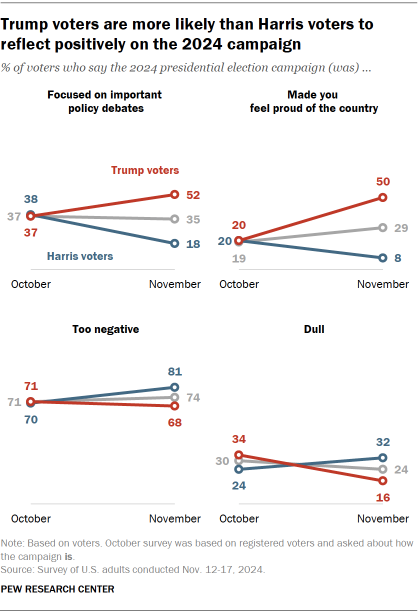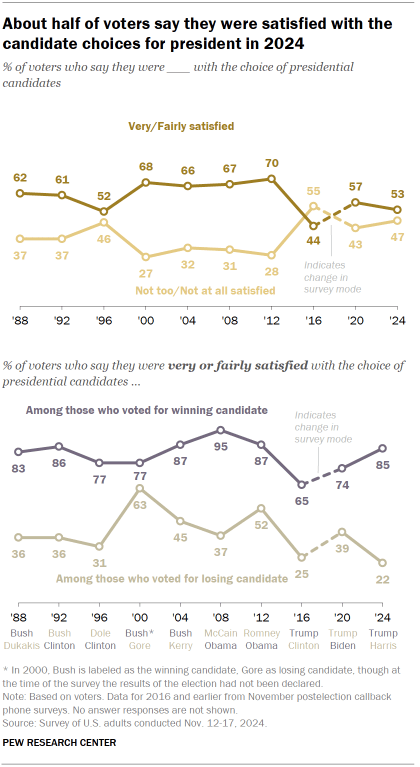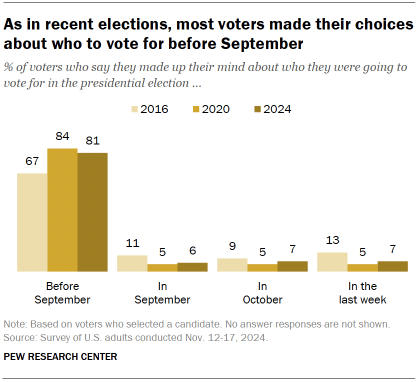Reflecting on the 2024 presidential campaign, a large majority of voters say it was interesting rather than dull (74% vs. 24%). But evaluations of the campaign are more negative than positive on other dimensions.
Roughly three-quarters of voters (74%) say the 2024 campaign was too negative, similar to the share of registered voters who said this in an October preelection survey.
More than six-in-ten voters (64%) say the 2024 campaign was not focused on important policy debates. In October, a nearly identical 62% of registered voters said this.
Seven-in-ten voters say the 2024 campaign did not make them feel proud of the country, while 29% say it did. These views are somewhat more positive than they were in October, when 19% of registered voters said the campaign made them feel proud of the country.
How Trump and Harris voters view the campaign

Trump voters are more likely than Harris voters to describe the 2024 campaign in positive terms. This reflects a shift from before the election: In October, there were only slight differences between Trump and Harris supporters’ views of the campaign.
Was the campaign focused on policy debates?
About half of Trump voters (52%) now say the 2024 campaign was focused on important policy debates. Just 18% of Harris voters share this view.
In October, 37% of Trump supporters and 38% of Harris supporters said the campaign was focused on important policy debates.
Did the campaign make you feel proud of the U.S.?
Half of Trump voters now say the 2024 campaign made them feel proud of the country, while only 8% of Harris voters say the same. Last month, the same percentage of both Trump and Harris supporters (20%) said the campaign made them proud.
Was the campaign too negative?
While majorities of both candidates’ voters say the 2024 campaign was too negative, Harris voters (81%) are more likely than Trump voters (68%) to say this. Before the election, about seven-in-ten in both groups said this.
Was the 2024 campaign interesting or dull?
Majorities of both Harris (66%) and Trump supporters (83%) say the campaign was interesting. But Harris supporters are twice as likely as Trump supporters (32% vs. 16%) to say the campaign was dull, a reversal from before Election Day. In October, Trump supporters (34%) were more likely than Harris supporters (24%) to say the campaign was dull.
Satisfaction with the presidential candidates

About half of voters (53%) say they were very or fairly satisfied with the choice of presidential candidates this year, while 47% say they were not too or not at all satisfied with the choice of presidential candidates.
A slightly smaller share of voters say they were satisfied with the choice of presidential candidates compared with four years ago, when 57% said they were very or fairly satisfied.
As in prior election years, supporters of the winning candidate express more satisfaction with the choice of candidates than supporters of the losing candidate.
More than eight-in-ten Trump voters (85%) say they were very or fairly satisfied with the choice of presidential candidates, compared with 22% of Harris voters.
Trump voters in 2024 are 11 percentage points more likely than Biden voters were in 2020 to say they were satisfied with the choice of candidates (85% vs. 74%). The share of Harris supporters who express satisfaction with the candidates is lower than the share of Trump supporters who did so four years ago.
When did voters make up their minds about who to vote for?

About eight-in-ten voters (81%) say they made up their mind about who they were going to vote for in the 2024 presidential election before September. This is similar to the share who said this in 2020 (84%), and higher than the share who reported having made up their minds before September in 2016 (67%).
This year, 7% of voters say they made up their mind about their vote in the last week before Election Day. In 2020, 5% said they had made their mind up in the last week.
Similar shares of Trump (7%) and Harris voters (6%) say they decided about their vote in the last week before Election Day. Trump voters are slightly more likely than Harris voters to report having made up their mind before September (84% vs. 79%).




